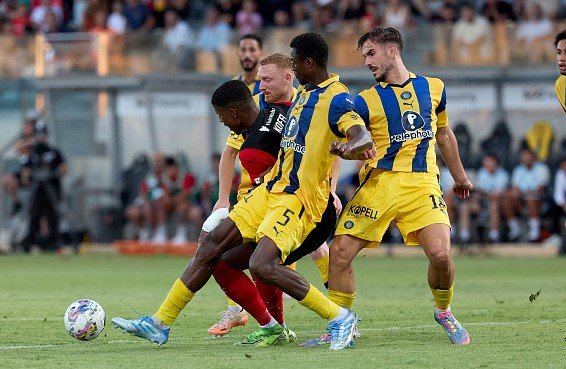Birmingham authorities have banned Maccabi Tel Aviv fans from attending their Europa League match against Aston Villa on November 6, 2025, citing major safety risks after violent clashes in Amsterdam. This decision, driven by local police and safety groups, has ignited a national debate over security, community tensions, and claims of discrimination in the city’s diverse neighborhoods.
Background of the Controversy
The ban stems from recent events where Maccabi Tel Aviv fans clashed with locals during a match in Amsterdam, leading to riots and arrests. Birmingham’s Safety Advisory Group, working with West Midlands Police, reviewed these incidents and decided that allowing away fans could spark similar unrest in Villa Park’s surrounding areas, which include large Pakistani and Bangladeshi communities.
Local leaders worry that the match could heighten tensions linked to the ongoing Israel-Gaza conflict. They point out that sports events often mix with politics, and hosting Israeli fans might be seen as endorsing certain views. Police reports highlight past behavior of some Maccabi supporters, including chants and actions that could provoke reactions.

This isn’t the first time fan bans have happened in football. In the 1980s, English clubs faced restrictions in Europe due to hooliganism, but those were mostly from football bodies, not local governments.
Reasons Behind the Ban
Authorities in Birmingham stress that the decision prioritizes public safety above all. They consulted Dutch police about the Amsterdam riots, where Maccabi fans were accused of racism, violence, and damaging property. West Midlands Police Chief Constable Craig Guildford called it a multi-dimensional threat assessment, ongoing as of October 24, 2025.
Community leaders argue the ban prevents potential chaos. They note Villa Park’s location in a multicultural area where emotions run high over global issues. Some councillors have urged boycotts, saying the game implicitly supports Israel’s actions in Gaza.
On the flip side, critics label the ban as unfair and possibly antisemitic. They say it punishes all fans for the actions of a few and questions why police can’t target troublemakers instead.
Here are key factors cited for the ban:
- History of violence: Recent Amsterdam incidents involved fights, flag tearing, and hate chants.
- Local demographics: High risk of protests in Birmingham’s diverse communities.
- Police resources: Concerns over managing large crowds and potential triple protests from various groups.
Reactions from Fans and Officials
Aston Villa fans are split. Some, like lifelong supporter Rpshan Doug, call the ban wrong, arguing it bows to pressure and denies law-abiding fans their right to attend. Others support it, fearing disruption to the game and neighborhood peace.
Government figures, including MPs, have pushed back. One MP described it as letting thugs win, while Jewish groups say it makes Birmingham unsafe for Israelis and Jews. Prime Minister’s office has weighed in, urging a review to ensure the city can host major events.
Internationally, Maccabi Tel Aviv’s chief expressed fears for player safety, and UEFA is monitoring the situation. Police defend the move but say discussions continue, with possible reversals if risks drop.
Public sentiment on social media shows division. Posts highlight worries over antisemitism, while others defend the ban based on Maccabi fans’ past actions.
Potential Impact on Future Matches
This controversy could affect Birmingham’s reputation as a host for big events. With the city set to welcome more international games, questions arise about handling diverse crowds. If the ban stands, it might set a precedent for other clubs facing similar issues.
Experts predict protests around the November 6 match, classified as high risk. Aston Villa has warned fans against political symbols, with ejections and bans for violations.
Looking ahead, football governing bodies might step in to standardize fan policies. Recent events, like fan bans in other leagues due to violence, show this is a growing trend.
| Event | Date | Key Details |
|---|---|---|
| Amsterdam Riots | November 2024 | Maccabi fans clash with locals, leading to arrests and injuries. |
| Ban Announcement | October 17, 2025 | Birmingham Safety Group bans away fans from Villa Park. |
| Police Statement | October 22, 2025 | Chief defends decision but notes ongoing review. |
| Match Date | November 6, 2025 | Aston Villa vs. Maccabi Tel Aviv at Villa Park. |
| Potential Protests | November 6, 2025 | Warnings of multiple demonstrations in Birmingham. |
Broader Implications for Football and Society
The ban raises bigger questions about mixing sports with global politics. In a connected world, football matches can become flashpoints for wider conflicts, as seen in past boycotts and protests.
For Birmingham, a city proud of its diversity, this tests community relations. Some residents fear it deepens divides, while others see it as necessary caution. Nationwide, it sparks talks on balancing free expression with safety.
Football analysts note that fan behavior has improved over decades, but isolated groups still cause problems. Solutions like better screening or education programs could help in the future.
As this story develops, share your thoughts in the comments below or on social media. What do you think about the ban? Your input could shape the ongoing debate.
